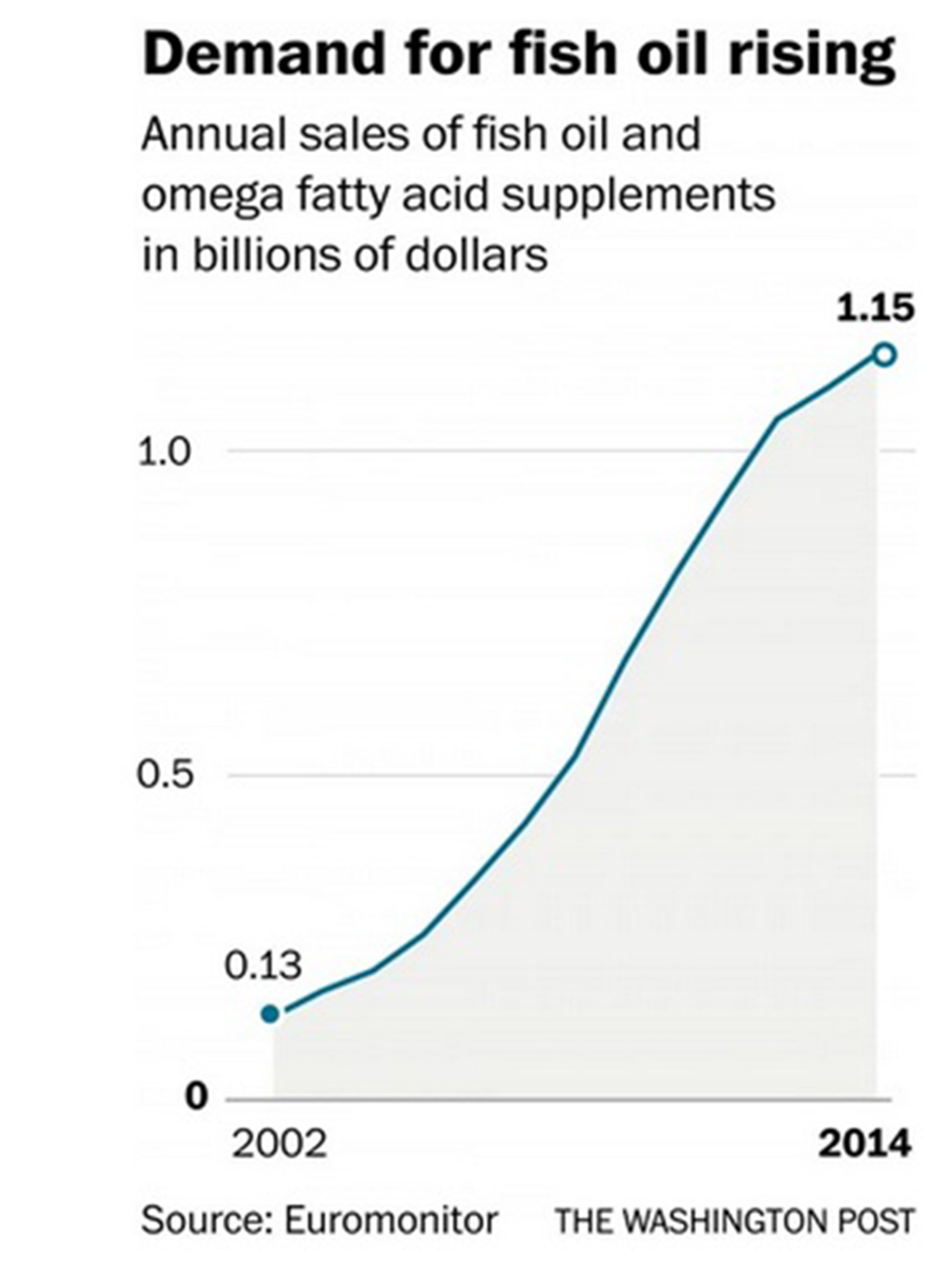Fish oil pills: Why the fabulously popular supplement may not be so healthy after all
The dispute over fish oil and its fatty acids known as omega-3s is part of a long and confusing debate about the role of fats in the American diet

For anyone wondering about whether to take a fish oil pill to improve your health, the Web site of the National Institutes of Health has some advice.
Yes. And no.
One page on the Web site endorses taking fish oil supplements, saying they are likely effective for heart disease, because they contain the “beneficial” fatty acids known as omega-3s.
But another page suggests that, in fact, the fish oil pills seem useless: “Omega-3s in supplement form have not been shown to protect against heart disease.”
“I can see how you might think that there is some inconsistency,” Paul R. Thomas, a scientific consultant in NIH’s Office of Dietary Supplements wrote in response to questions about the NIH pages.

Few issues better reflect the American confusion over diet.
People in the United States spend about $1.2 billion annually for fish oil pills and related supplements even though the vast majority of research published recently in major journals provides no evidence of a health benefit.
The “accrual of high-level evidence,” according to a review of studies published last year in an American Medical Association journal, shows “that the supplements lack efficacy across a range of health outcomes.”
While the persistent popularity of fish oil may reflect the human weakness for anything touted as a life-extending elixir, it also reflects that, even among scientists, diet notions can persist even when stronger evidence emerges contradicting them. Scientists, sometimes, are reluctant to let go of ideas.
“Unfortunately, it’s a common situation,” said John P.A. Ioannidis, a professor at Stanford University who has critiqued the methods and findings in nutritional research.
Too often, in the view of Ioannidis and colleagues, claims that one food or another has a particular health effect persist long after they have been contradicted by more exacting research.
For example, his research showed that various claims regarding vitamin E, estrogen and beta-carotene continued to find an audience among scientists — as reflected in scientific papers — even when initial claims about them appear to have been trounced.
“What we have found is that the original papers continue to be cited well after they have been refuted,” he said. “These claims do not easily die away.”
Sorting through warnings
American consumers have long had to sort through confusing contradictions over what food is healthful to eat. And the trouble lies partly in the realm of science, where researchers sometimes have developed diet advice that, despite weakness in the supporting evidence, has been urged on the public.

This year, for example, a federal advisory panel recommended withdrawing the government’s long-standing warning about consuming foods rich in cholesterol, decades after scientists began to argue that the warning was wrongheaded.
Likewise, the long-lived admonition that Americans are using too much salt is facing a strong challenge from research published in prominent medical journals.
The dispute over fish oil and its fatty acids known as omega-3s, meanwhile, is part of a long and confusing debate about the role of fats in the American diet. As far back as 1977, the U.S. Dietary Goals, a forerunner of the federal government’s influential U.S. Dietary Guidelines, called for Americans to eat more carbohydrates and eat less fat. That position is now widely regarded as misguided.
A closer look at the fish oil recommendation shows how health authorities first recommended fish oil despite mixed evidence, then let the recommendation stand even as studies suggesting their worthlessness mounted.
The result can be confusion.

The American Heart Association, for example, recommends that some people with heart disease “may want to talk to their doctor about [omega-3] supplements.” But when the association was asked for an expert to explain the recommendation, that expert, former AHA president Robert Eckel, said that the recommendation needs to be revised.
“It would be a good time for that to be updated,” Eckel said. “Almost all studies of fish oil supplements show no benefit. I really feel this remains unproven.”
An AHA spokesman added: “AHA guideline committees are always reviewing guidelines and assessing whether updates are needed. AHA cannot discuss any guidelines or statements that are currently in the works.”
As for the confusing advice on the NIH Web site, Thomas said the page that endorses fish oil was provided to the NIH by a third party that assesses diet advice.
“Their conclusion that fish oil omega-3s are likely effective for heart disease is generous,” he said. “Whether fish oil can help healthy people prevent or reduce their risks of cardiovascular disease when taken over months and years is still an open scientific question.”
A fish oil story
The fish oil story begins with the account of its discovery. In the 1970s, two Danish scientists, Hans Olaf Bang and Jorn Dyerberg, visited remote Inuit villages in northwest Greenland.
The people in those villages ate mostly whale, seals and fish, according to the scientists. While orthodox thinking at the time suggested that a diet so rich in animal fat would cause heart disease, reports of heart attacks there were very few. Bang and Dyerberg were intrigued.
During their visit, they drew blood samples of 130 Inuits. The samples showed low levels of cholesterol and triglycerides, which are viewed as markers of heart disease.
Eventually, the two formally would hypothesize that the low levels of heart disease among the Inuit was caused by the omega-3s in their fishy diets.
One of the first major tests of this idea was published in the British medical journal the Lancet in 1989. The test, often referred to as the DART study, looked at more than 2,000 Welsh men who had suffered heart attack; some were told to eat more oily fish. That group, it turned out, was 29 percent less likely to die over the next two years.

The demand for fish oil was about to grow. Pharmacies and health food stores were stocking up on fish oil supplements in the ’80s, and by the mid-90s, the industry counted sales in the tens of millions.
But it wasn’t until the early 2000s that the market began to soar. In part, the enthusiasm stemmed from the advice from the broadly influential American Heart Association.
In 2002, the association issued a “Scientific Statement” concluding that “omega-3 fatty acids have been shown in epidemiological and clinical trials to reduce the incidence of cardiovascular disease.”
The statement, however, was based on mixed evidence. Some of the observational studies at the time showed that eating fish provided a benefit; others didn’t. Two randomized trials showed a benefit, while a third didn’t. At the same time, consuming fish and fish oil didn’t show harmful effects, either.
Bill Harris, one of the three authors of the AHA statement, said that currently the “evidence is unclear” on the benefits of fish oils.
But “it all made a lot of sense at the time,” said Harris, now a professor at the University of South Dakota. He is also president of OmegaQuant, a company that analyzes the content of foods. “There seemed to be a benefit, and they were safe, so there was just no downside. Everything looked good, so why not do it?”
The AHA continues to endorse the use of fish oil, suggesting that people with heart disease, particularly those who don’t eat much fish, “may want to talk to their doctor about supplements.”

In 2003, some of the researchers who conducted the early and influential DART study published the results of a follow-up. Of 3,000 Welsh men with angina — a chest pain caused by coronary heart disease — some were advised to eat oily fish or take fish oil supplements. This time, the fish group patients were more likely to die, and the researchers said it was particularly worse for those taking the fish oil pills.
“The excess risk [of cardiac death] was largely located among the subgroup given fish oil capsules,” they reported.
That finding didn’t stop the growth in sales of fish oil pills, however, even though the pages of the academic journals were filling with evidence that fish oil has no benefits.
Andrew Grey and Mark Bolland, researchers at the University of Auckland in New Zealand, for example, last year reviewed fish oil research published in major journals between 2005 and 2012 based on randomized clinical trials. Twenty-two of the 24 studies showed no benefit, according to their work published in JAMA Internal Medicine.

It is possible that fish oil has health benefits that scientific experiments are not sensitive enough to detect.
Most trials have focused on the effects of fish oil on people who have had a history of heart trouble. The trouble with those studies is that such patients are typically taking an array of heart medicines, such as statins, blood thinners and beta blockers. It is possible, scientists say, that the effects of the fish oil can’t be detected among the effects of the other medicines.
An ongoing trial of 26,000 people, however, will focus on the effects of fish oil on a broader set of patients — including those who don’t already have heart disease or use multiple heart medicines.
JoAnn E. Manson, principal investigator of the trial and chief of preventive medicine at the Harvard-affiliated Brigham and Women’s Hospital in Boston, said that it is biologically plausible that omega-3s could protect against heart disease, though there’s not enough evidence to recommend fish oil supplements routinely.
“It’s amazing how popular the fish oil supplements have become without conclusive evidence of their efficacy,” she said.
In the absence of clear messages from health authorities, however, consumers are faced with a barrage of unproven promises.
“The omega-3s [EPA and DHA] in fish oil help support a healthy heart,” according to Nature Made, one company that sells the supplements.
“Their benefits go far beyond the heart,” says Nordic Naturals, which boasts of offering the “#1 selling fish oil in the U.S.”
And Dr. Tobias, another leading fish oil company, suggests that the pills help defend against a remarkable array of ailments. It says “supportive but not conclusive studies indicate benefits of Omega 3 essential fatty acids” for heart disease, dementia, Alzheimer’s, arthritis, symptoms of asthma, pneumonia, depression, suicide, wrinkles, acne and psoriasis.
“At the end of the day, omega-3s are healthy fats,” said Adam Ismail, executive director of the Global Organization for EPA and DHA Omega-3s, an industry group. “We believe they prevent heart disease.”
Copyright: Washington Post
Create a FREE account today
Registration is a free and easy way to support our truly independent journalism
By registering, you will also enjoy access to The Independent app, exclusive newsletters, commenting, and virtual events with our leading journalists.
By clicking ‘Create my account’ you confirm that your data has been entered correctly and you have read and agree to our Terms of use, Cookie policy and Privacy policy.
This site is protected by reCAPTCHA and the Google Privacy policy and Terms of service apply.
Already have an account?
By clicking ‘Register’ you confirm that your data has been entered correctly and you have read and agree to our Terms of use, Cookie policy and Privacy policy.
This site is protected by reCAPTCHA and the Google Privacy policy and Terms of service apply.
By clicking ‘Register’ you confirm that your data has been entered correctly and you have read and agree to our Terms of use, Cookie policy and Privacy policy.
This site is protected by reCAPTCHA and the Google Privacy policy and Terms of service apply.
Join our commenting forum
Join thought-provoking conversations, follow other Independent readers and see their replies
0Comments